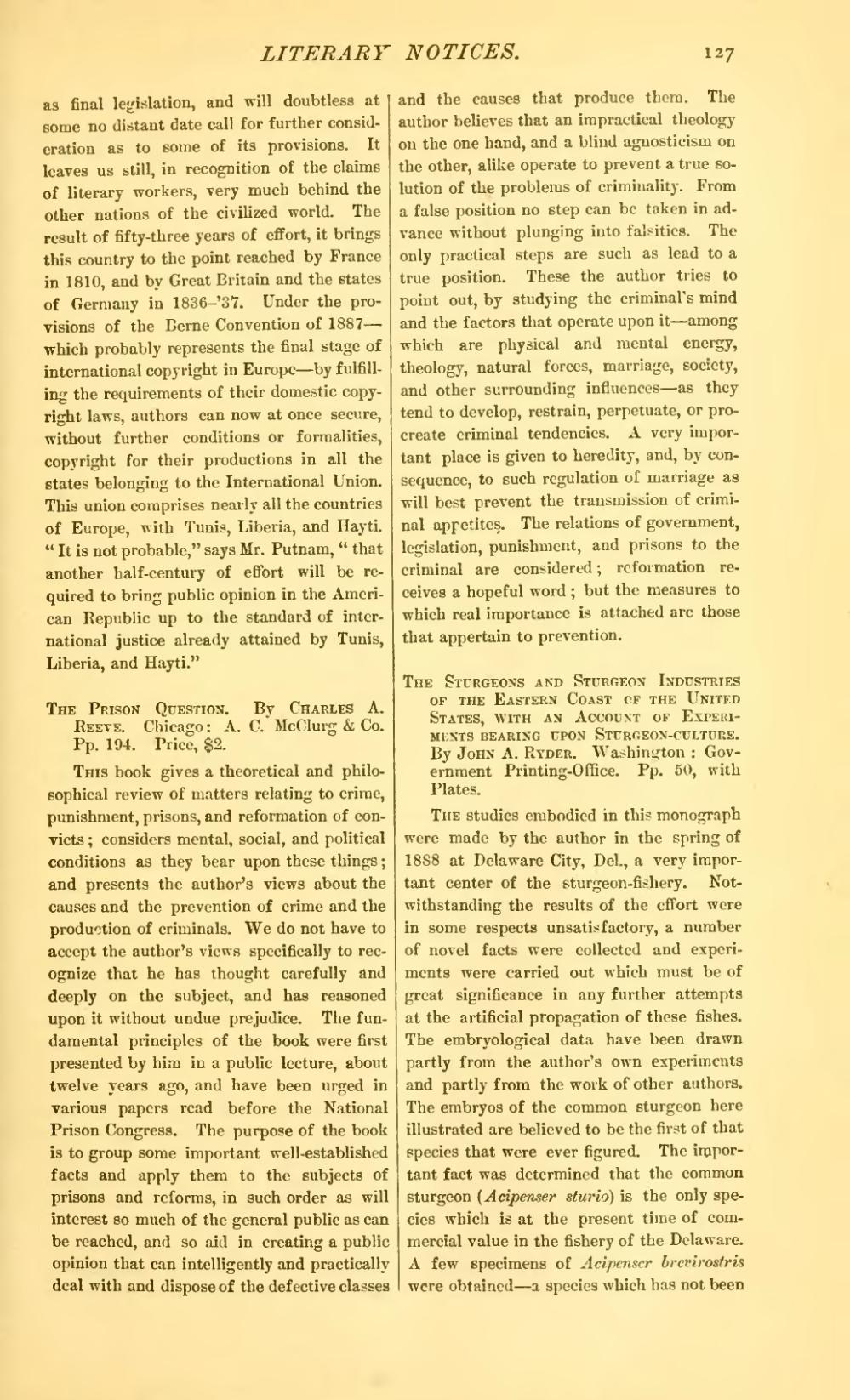as final legislation, and will doubtless at some no distant date call for further consideration as to some of its provisions. It leaves us still, in recognition of the claims of literary workers, very much behind the other nations of the civilized world. The result of fifty-three years of effort, it brings this country to the point reached by France in 1810, and by Great Britain and the states of Germany in 1836-'37. Under the provisions of the Berne Convention of 1887—which probably represents the final stage of international copyright in Europe—by fulfilling the requirements of their domestic copyright laws, authors can now at once secure, without further conditions or formalities, copyright for their productions in all the states belonging to the International Union. This union comprises nearly all the countries of Europe, with Tunis, Liberia, and Hayti. "It is not probable," says Mr. Putnam, "that another half-century of effort will be required to bring public opinion in the American Republic up to the standard of international justice already attained by Tunis, Liberia, and Hayti."
The Prison Question. By Charles A. Reeve. Chicago: A. C. McClurg & Co. Pp. 194. Price, $2.
This book gives a theoretical and philosophical review of matters relating to crime, punishment, prisons, and reformation of convicts; considers mental, social, and political conditions as they bear upon these things; and presents the author's views about the causes and the prevention of crime and the production of criminals. We do not have to accept the author's views specifically to recognize that he has thought carefully and deeply on the subject, and has reasoned upon it without undue prejudice. The fundamental principles of the book were first presented by him in a public lecture, about twelve years ago, and have been urged in various papers read before the National Prison Congress. The purpose of the book is to group some important well-established facts and apply them to the subjects of prisons and reforms, in such order as will interest so much of the general public as can be reached, and so aid in creating a public opinion that can intelligently and practically deal with and dispose of the defective classes and the causes that produce them. The author believes that an impractical theology on the one hand, and a blind agnosticism on the other, alike operate to prevent a true solution of the problems of criminality. From a false position no step can be taken in advance without plunging into falsities. The only practical steps are such as lead to a true position. These the author tries to point out, by studying the criminal's mind and the factors that operate upon it—among which are physical and mental energy, theology, natural forces, marriage, society, and other surrounding influences—as they tend to develop, restrain, perpetuate, or procreate criminal tendencies. A very important place is given to heredity, and, by consequence, to such regulation of marriage as will best prevent the transmission of criminal appetites. The relations of government, legislation, punishment, and prisons to the criminal are considered; reformation receives a hopeful word; but the measures to which real importance is attached are those that appertain to prevention.
The Sturgeons and Sturgeon Industries OF the Eastern Coast of the United States, with an Account of Experiments bearing upon Sturgeon-culture. By John A. Ryder. Washington: Government Printing-office. Pp. 50, with Plates.
The studies embodied in this monograph were made by the author in the spring of 1888 at Delaware City, Del., a very important center of the sturgeon-fishery. Notwithstanding the results of the effort were in some respects unsatisfactory, a number of novel facts were collected and experiments were carried out which must be of great significance in any further attempts at the artificial propagation of these fishes. The embryological data have been drawn partly from the author's own experiments and partly from the work of other authors. The embryos of the common sturgeon here illustrated are believed to be the first of that species that were ever figured. The important fact was determined that the common sturgeon (Acipenser sturio) is the only species which is at the present time of commercial value in the fishery of the Delaware. A few specimens of Acipenser brevirostris were obtained—a species which has not been

